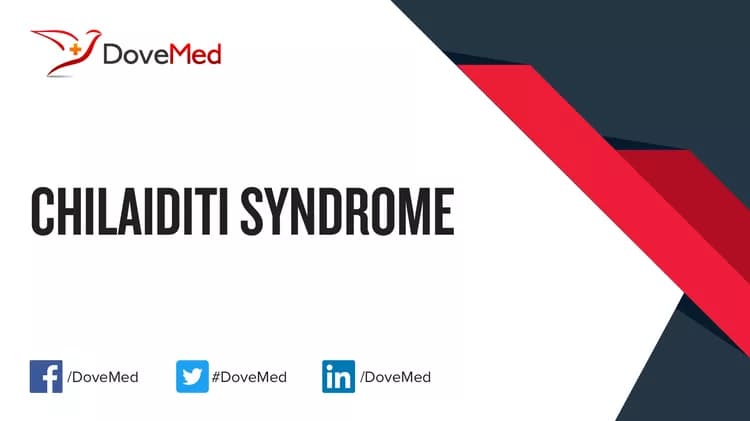What are the other Names for this Condition? (Also known as/Synonyms)
- Hepatodiaphragmatic Interposition of the Intestine
- Pseudopneumoperitoneum
- Subphrenic Interposition Syndrome
What is Chilaiditi Syndrome? (Definition/Background Information)
- Chilaiditi Syndrome is a medical condition in which a portion of the colon is abnormally positioned between the liver and the diaphragm
- The exact cause of Chilaiditi syndrome is unknown. The condition appears to occur with higher frequency among individuals with chronic lung disease, scarring of the liver (cirrhosis), and in those with an accumulation of ascites in the abdomen
- Other risk factors may include reduced liver volume, paralysis of the motor nerve to the diaphragm (phrenic nerve palsy), and obesity. In some cases, the condition is present from birth (congenital)
- Symptoms vary, but may include abdominal pain, nausea, vomiting, and small bowel obstruction. In many cases, there are no symptoms and the interposition is an incidental finding. When no symptoms are present, the clinical finding is called Chilaiditi's sign
- Treatment is symptomatic and supportive
(Source: Chilaiditi Syndrome; Genetic and Rare Diseases Information Center (GARD) of National Center for Advancing Translational Sciences (NCATS), USA.)
Who gets Chilaiditi Syndrome? (Age and Sex Distribution)
- Chilaiditi Syndrome is a very rare disorder, affecting less than 0.3% of the general population
- The presentation of symptoms may occur at any age, although the condition is more common in the elderly adults
- Both males and females may be affected
- Worldwide, individuals of all racial and ethnic groups may be affected
What are the Risk Factors for Chilaiditi Syndrome? (Predisposing Factors)
The risk factors for Chilaiditi Syndrome may include:
- Chronic lung disease
- Cirrhosis
- Accumulation of ascitic fluid in the abdomen, termed ascites
- Reduced liver volume
- Paralysis of the motor nerve to the diaphragm (phrenic nerve palsy)
- Obesity
(Source: Chilaiditi Syndrome; Genetic and Rare Diseases Information Center (GARD) of National Center for Advancing Translational Sciences (NCATS), USA.)
It is important to note that having a risk factor does not mean that one will get the condition. A risk factor increases one’s chances of getting a condition compared to an individual without the risk factors. Some risk factors are more important than others.
Also, not having a risk factor does not mean that an individual will not get the condition. It is always important to discuss the effect of risk factors with your healthcare provider.
What are the Causes of Chilaiditi Syndrome? (Etiology)
The exact cause of development of Chilaiditi Syndrome is not known at the present time.
What are the Signs and Symptoms of Chilaiditi Syndrome?
The signs and symptoms of Chilaiditi Syndrome may vary among affected individuals in type and severity. Some affected individuals may be asymptoatic, while others may experience severe signs and symptoms, which may include:
- Chronic recurrent abdominal pain
- Nausea and vomiting
- Constipation, indigestion
- Difficulty swallowing
- Abdominal tenderness, especially in the upper, central area
- Breathing problems
(Source: Chilaiditi Syndrome; Genetic and Rare Disease Information Center (GARD) of National Center for Advancing Translational Science (NCATS), USA.)
How is Chilaiditi Syndrome Diagnosed?
Chilaiditi Syndromey is diagnosed on the basis of the following information:
- Complete physical examination
- Thorough medical history evaluation
- Assessment of signs and symptoms
- Laboratory tests
- Imaging studies
- Biopsy studies, if necessary
In asymptomatic individuals, the diagnosis may be incidental.
Many clinical conditions may have similar signs and symptoms. Your healthcare provider may perform additional tests to rule out other clinical conditions to arrive at a definitive diagnosis.
What are the possible Complications of Chilaiditi Syndrome?
The complications of Chilaiditi Syndrome may include:
- Chronic, severe pain
- Weight loss
Complications may occur with or without treatment, and in some cases, due to treatment also.
How is Chilaiditi Syndrome Treated?
- Treatment of Chilaiditi Syndrome is directed at the individual symptoms present. In some cases, treatment is not needed
- Reducing (or removing) the pressure within the abdomen may help alleviate symptoms. This may be achieved through conservative measure that address constipation, pain, and distention
- Surgical intervention may include removal of a portion of the colon, or anchoring of the liver to the abdominal wall
(Source: Chilaiditi Syndrome; Genetic and Rare Diseases Information Center (GARD) of National Center for Advancing Translational Sciences (NCATS), USA.)
How can Chilaiditi Syndrome be Prevented?
At the present time, no methods or guidelines are available for the prevention of Chilaiditi Syndrome.
- Regular medical screening at periodic intervals with tests and physical examinations are recommended
- Seeking medical attention for characteristic signs and symptoms may aid in an early diagnosis and avoiding complications
- Active research is currently being performed to explore the possibilities for treatment and prevention of disorders such as Chilaiditi Syndrome
What is the Prognosis of Chilaiditi Syndrome? (Outcomes/Resolutions)
- The prognosis of Chilaiditi Syndrome is dependent upon the severity of the signs and symptoms and associated complications, if any
- Individuals with mild conditions have better prognosis than those with severe symptoms and complications
- Typically, the prognosis may be assessed on a case-by-case basis
Additional and Relevant Useful Information for Chilaiditi Syndrome:
- Chilaiditi Syndrome is named after the Greek radiologist Demetrius Chilaiditi, who first described the condition in 1910
The following DoveMed website link is a useful resource for additional information:
Related Articles
Test Your Knowledge
Asked by users
Related Centers
Related Specialties
Related Physicians
Related Procedures
Related Resources
Join DoveHubs
and connect with fellow professionals


0 Comments
Please log in to post a comment.